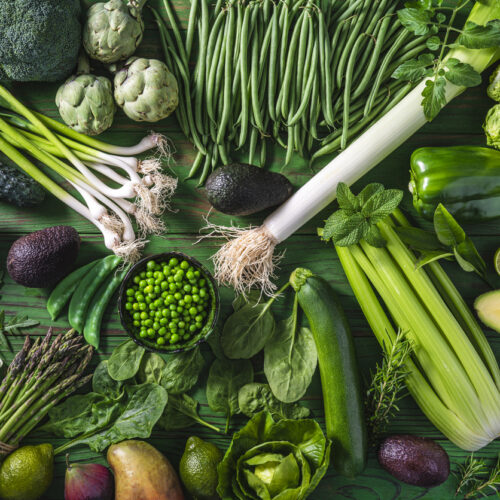
Keeping our brain healthy means good things for the rest of our body and our mental health. Dietitian Katrina Pace investigates how we can best nourish this hard-working organ.
Having a healthy diet means we’re on a solid foundation to make sure our body and brain can support us when life throws us a curve ball.
What we eat and drink is the fuel needed to produce all the right neurotransmitters, hormones and enzymes that keep our body systems running smoothly.
Having the right energy sources, vitamins and minerals, and feeding a healthy colony of gut bacteria means we’re more likely to be able to weather periods of stress in our lives.
How much energy does the brain need?
The average adult brain uses about 20 per cent of the energy we consume as food and drink. For an average intake of 8700kJ, that means the brain uses around 1740kJ. That’s more than any other organ in our body, and that’s just when we’re resting – not thinking hard or moving around. Neuroscientists reckon about a quarter of that energy is needed to keep brain cells healthy and in working order, but a massive three-quarters of the energy the brain uses is for electrical communications between brain cells.
Depending on what tasks we’re doing, more energy is channelled to certain areas of the brain. And different functions require different amounts of energy. For example hearing burns more energy than smell.
Glucose is the main source of energy for the brain. It uses about 120g of glucose daily.
In times of starvation or in low-carbohydrate diets the brain will use energy from ketone bodies: acetone, acetoacetate and betahydroxybutyrate, which are produced by the liver from stored fat.
If you’re experiencing mental health problems there’s the possibility your appetite will decrease. Eating less energy (kilojoules) means your brain has less glucose to use.
This can be when your body starts using ketone bodies from fat stores, causing unintentional weight loss, and the feeling that you’re not firing on all cylinders.
Having small, frequent snacks at hand and setting an alarm to remind you to eat may help give your brain enough energy to run efficiently during this time.
How do vitamins and minerals affect our brain health?
Vitamins and minerals power the many biochemical reactions that go on every second in our body. These reactions turn the other nutrients from our food into forms that the body can use, which then build neurotransmitters, enzymes and hormones, among other things. Some of the most important brain-loving vitamins and minerals have their own dedicated transporter systems across the blood-brain barrier, a shield that helps protect the brain from unwanted or unsafe substances.
What are the best foods for brain health?
Oily fish
Omega-3 fatty acids in oily fish have been shown to reduce inflammation and may help manage depression.
Red meat
Red meat is high in iron. Low iron can be common in young women and may cause fatigue and anxiety.
A rainbow of fruit and vegetables
Fruit and vegetables contain a range of important vitamins and minerals, including antioxidants and folate, which are important for brain health. Low intakes of fruit and veges have been repeatedly found in people who are suffering with depression.
Nuts and seeds
Nuts and seeds contain magnesium, zinc and tryptophan, which are all essential for serotonin production (our body’s homemade happy drug).
Whole grains and legumes
B vitamins are found in many wholegrain cereals and legumes (beans and lentils), and are essential for the structure and function of brain cells. Whole grains are also a favourite food for our gut bacteria which, in turn, play a part in our brain health.
What are the unhelpful foods for brain health?
What we eat can play an important role in our mental health. And while there is research looking at individual nutrients and their role in anxiety, depression and other mental health conditions we don’t eat nutrients on their own but as meals and snacks made up of a combination of nutrients that vary daily and weekly.
Research shows a variety of results when looking at the link between depression and dietary patterns, but a recent meta-analysis shows that a diet with lots of fruit and vegetables, whole grains, olive oil, fish and low-fat dairy decreases the risk of depression. And a diet high in red or processed meat, refined grains, sweets, high-fat diary and low in fruit and vegetables was associated with an increased risk of depression.
Does it matter what I drink?
Dehydration can increase feelings of anger, hostility, confusion, depression, fatigue and tension. So making sure you’re drinking regularly during the day may help you cope with daily stresses.
A study of over 44,000 Americans showed a link between sugary drinks and depression risk, and the link was stronger with women than with men. This study found that for every sugary drink consumed each day, the risk of depression increased by 5 per cent.
Mental illness may also affect alcohol intake. People with mental health symptoms are more likely to increase their alcohol consumption, and more likely to keep drinking a lot if they already do. There is, however, no direct link between alcohol intake and mental health status. But alcohol use disorders are often found alongside severe mental health conditions, such as depression, anxiety, bipolar and PTSD.
www.healthyfood.com










